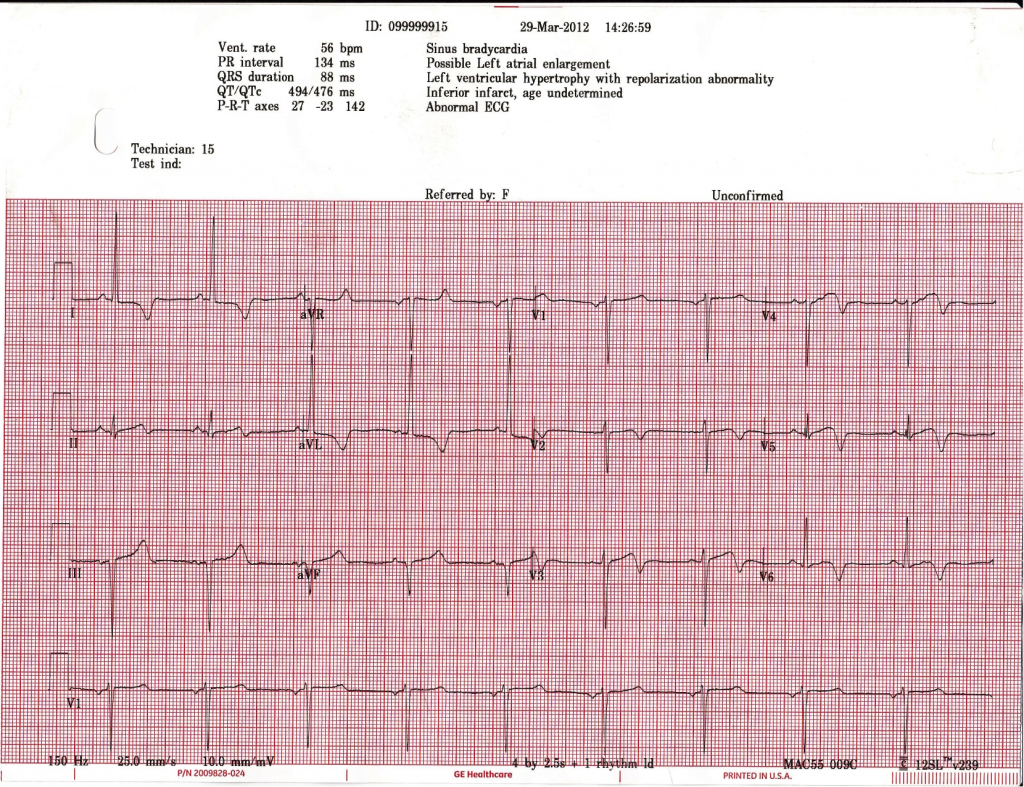Here’s another EKG to get you guys talking. Thank you Dr. Silverberg and Dr. Brown for the case.
73 chinese female h/o dm, htn and high cholesterol had syncopal episode. Felt heart racing and palpitations prior to passing out at bingo in her church. Only complaint now is slight chest pain that is similar in nature to what she felt prior to today’s syncope only it was worse then. Vitals: hypertensive but the rest normal including the physical.
What’s the diagnosis?
What’s your management?
The views expressed on this blog are the author's own and do not reflect the views of their employer. Please read our full disclaimer here. Any references to clinical cases refer to patients treated at a virtual hospital, Janus General Hospital.
The following two tabs change content below.


jwillis
James Willis, MD. Assistant Program Director at SUNY Downstate / Kings County.
Latest posts by jwillis (see all)
- Bedside Teaching - June 11, 2015
- How to Give A Lecture - February 12, 2015
- See One, Do One, Teach One: What Do EM Learners Want? - August 28, 2014
- Wednesday Wrap-Up - November 14, 2012
- Wednesday Wrap-up 8/1/12 - August 2, 2012


This EKG is concerning. The T waves in the anterior, lateral and inferior leads are inverted and some are biphasic. The ST segment is not concave. My suspicion for an acute MI is very high.
I would give aspirin, give nitro for chest pain, cardiac labs, try and get an old EKG, repeat ekg with any episode of chest pain, early cardiology consult, pacer pads attached and would make sure they are being placed on continous cardiac monitoring.
Just to add it looks like wellen’s warning or wellen’s syndrome which can be a sign of proximal LAD occlusion, would definately NOT stress this patient, would push for direct catheterization
Another great EKG. It should make you nervous. We can’t really call this a STEMI. however. the morphology of the ST changes is very concerning. Maybe we should stress him to see if has reversible CAD? Good idea?
I am sure some of the studs out there will nail this case.
Read:
Rhythm: Sinus
Rate: 56
Axis: Left axis deviation (-23)
P-waves: inverted in V1 suspicious for LAE
PR Interval: Normal (134)
QRS: Narrow (88)
Q waves: III and aVF, suspicious for old inferior MI
R waves: Good progression V1-V6
LVH: Meets Cornell’s Voltage critieria
ST segment: No elevations or depressions
T waves: Flipped in I,aVL,V2,V6
Biphasic in V3-V5
Answer: LAD coronary T-wave syndrome (Wellen’s Syndrome)
First described in 1980’s by Wellen
Criteria:
Progressive symmetrical deep T wave inversion in leads V2 and V3 a variant is biphasic T waves
Little or no cardiac marker elevation
Discrete or no ST segment elevation
No loss of precordial R waves.
Pattern abnormal during chest-pain free periods
As seen in eMedicine:
“Wellens syndrome represents critical stenosis of the left anterior descending coronary artery (LAD). LAD’s nickname “widow maker.” The LAD supplies the anterior wall of the heart, including both ventricles, as well as the septum. An occlusion in this vessel can result in serious ventricular dysfunction
Evolution to an anterior wall infarction is rapid, with a mean time of 8.5 days from onset of Wellens syndrome to infarction.”
These patient’s usually have at least 50% stenosis if their LAD and should not undergo stress test. These patient should receive angiography for possible PCI or CABG.
That’s what I came up with. Any other thoughts. I think Shin was correct.